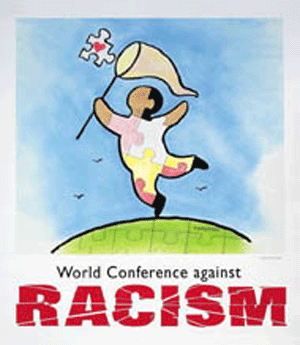
World Conference against Racism, Racial Discrimination,
Mary Robinson appeals to Australians' compassion
Xenophobia and Related Intolerance
31 August 2001
by Stephen Webb
Speaking at a WCAR media briefing, she said it was "very, very worrying that a country with a fine tradition like Australia could find itself unable to reach out".
The 434 people aboard the Norwegian ship Tampa are very vulnerable and have unclear legal status, but are entitled to have their cases examined, she said.
Robinson confirmed that UN secretary-general Kofi Annan has been in touch with the Australian prime minister John Howard, and that the UNHCR has sent strong pleas that there be an opportunity for proper examination of the people's refugee status.
Saying that it is very clear where the responsibility lies, Robinson appealed to the Australian people to look at the human rights implications of the situation.
The World Council of Churches (WCC) has said Australia's treatment of asylum seekers was "deeply troubling". An August 29 letter sent by the WCC general secretary, Rev. Dr Konrad Raiser, to WCC member churches in Australia and the National Council of Churches of Australia said: "We have been dismayed by the initial reaction of the Australian government ... The right to seek and enjoy asylum is a basic human right which must be upheld throughout the world - and on Christmas Island."
"While Australia is certainly not alone in the world in implementing measures to deter asylum-seekers, such policies stand in stark contrast to Australia's history as a country of immigration and of refuge... It is truly sad to see the public debate in Australia now characterized by stereotyping, xenophobia and lack of compassion. Moreover, it is deeply troubling to see Australia's role in the international community changing from one of support and leadership for a collective response by the international community to one of questioning international obligations," the letter continued.
"Together with the churches joined in the NCCA, the World Council of Churches is particularly concerned about the wider pattern of policies toward asylum-seekers currently being followed by the Australian government:
"When the Australian government calls for changes in the 1951 Refugee Convention to prevent people from seeking asylum in other countries, the whole international regime of refugee protection is weakened," the letter argued.